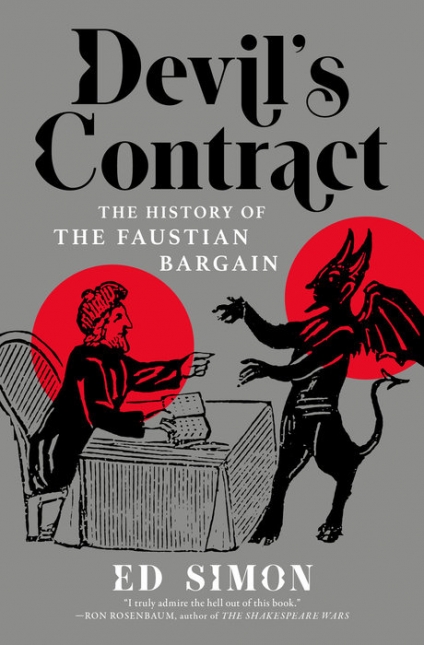Devil’s Contract: The History of the Faustian Bargain
- By Ed Simon
- Melville House
- 336 pp.
- Reviewed by William Rice
- July 23, 2024
Does every human woe involve cutting a deal with Satan? Apparently.

To someone with a hammer, it’s said, everything looks like a nail. Apparently, if you write a book about the Faust legend, nearly every human endeavor begins to look like it hinges on a bargain with the devil. Christ in the desert; the composer at his piano; the scientist in his lab; the director behind the camera; American popular culture; modern life itself: According to Ed Simon’s Devil’s Contract: The History of the Faustian Bargain, they all entail some form of negotiation with Lucifer, consummated or not. But if nearly everything has diabolical roots, this disturbing concept loses a lot of force.
Simon tells us the first recognizable version of the story of the learned man trading his immortal soul for worldly benefit appeared in the writings of a 10th-century German abbess. It entered the English-language consciousness with the Elizabethan playwright Christopher Marlowe’s “Dr. Faustus” and achieved its greatest iteration more than 200 years later in the German poet Goethe’s Faust.
The doctor’s goal in striking his deal changed over the centuries. Originally, he just wanted power and pleasure. It wasn’t until the Faust libel was attached to an 11th-century French pope — who courted accusations of demonic intervention by studying in Islamic Spain and bringing back to Christendom dark learnings (e.g., Arabic numerals) — that a thirst for knowledge was first added to the invoice. Then, Goethe introduced the desire for “experience.”
But Simon seeks and finds the Faustian bargain far beyond the pages of literature. He maintains Jesus withstanding temptation in the wilderness was a devilish deal that fell through. Later, he challenges the reader: “Tell me that there isn’t a bit of the sulfurous about artists.” He dubs fascism “the politics of the Faustian bargain” and declares the United States “the Faustian republic.” According to Simon, every time we click “accept” on a privacy notice, we’re signing the devil’s contract, and artificial intelligence is Satan sent here to tempt us.
The author abhors fundamentalist religion, calling early American Calvinism “a type of madness,” “torture,” and “nihilism.” And he denounces neo-liberalism, libertarianism, and “all manner of capitalist enthusiasm” as religion masquerading as reasoned economics. Yet he displays his own kind of fevered evangelism about the sources and likely outcomes of the problems facing our world. Instead of selling our souls, he argues, we traded the survival of our planet for steam engines, air conditioning, and same-day delivery. The planet’s rising temperatures are wafts of the underworld as Lucifer makes his way up to collect his due.
Simon is, of course, not alone in this puritanical take on the climate crisis. But is it rational to blame past generations who, unlike Faust, had no idea what they were trading for understandable desires like faster transportation and warmer homes? For that matter, does it really make sense to shame ourselves for seeking out greater comfort and convenience, the chief aims of every living organism?
Better to acknowledge what we’ve gained from industrial society — penicillin, improved nutrition, longer lifespans — while figuring out in a judgment-free way how to maintain the best of modern life while still heading off ecological disaster. A transition to electric cars and renewable energy, absent any self-loathing, may lack the drama of a Faustian showdown, but it’s probably a smoother solution.
Simon’s impassioned — one might almost say possessed — approach to his story results in a lot of overheated, sloppy writing. A hefty portion of the sentences are fragments; different versions of the same text coexist and overlap; and key words and concepts repeat in close proximity. Attempts at high-flown language often crash: To fully inhabit the past from which the Faust story emerges, he explains, “is to grasp toward a kingdom that none of us now living can ever really acquire the keys for.”
Like a wizard wielding exotic verbiage to impress the gullible, Simon shows off a lot of obscure words that would’ve benefited from in-text definitions (I’m looking at you, chthonic, heteroglossia, and grimoire).
Still, his tone is sincere, and insights and interesting tidbits occasionally emerge amid all the surface bluster. He intriguingly argues that what separates demonic magicians from devout clerics is “less what supernatural reality [God or the devil] they’re interacting with then [sic] with their reasons for doing so.” The author plausibly posits that the Faustian legend is “merely the darker variation” of the humanistic belief in the perfectibility of Man. A big fan of Marlowe, he calls this dissolute contemporary of the Bard the “Rolling Stones to Shakespeare’s Beatles.”
Simon’s writing is particularly sharp in a chapter on the development of the atom bomb. An elite group of scientists privileging their drive for knowledge over their moral doubts to bring mankind the power to destroy itself evokes the Faustian bargain far more than does the slow-motion (and unintended) catastrophe of global warming. And Simon’s imagery here is commensurately stronger, including his chilling description of that first, blinding atomic test as a “false dawn.”
Much like the power-hungry doctor himself, the concept of Faust eventually conquers everything. Simon declares we’re all living in the “Faustocene” era, and our job now is to figure out “how to finally void the contract that our ancestors signed.”
William Rice is a writer for political and policy-advocacy organizations.

